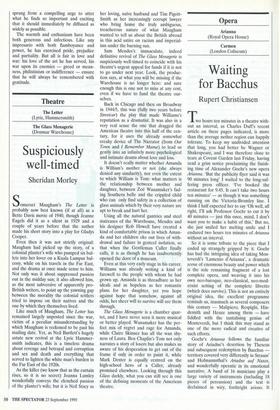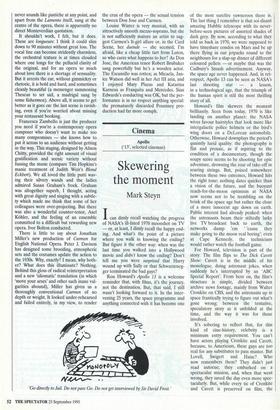Opera
Arianna
(Royal Opera House) Carmen (London Coliseum)
Waiting for Bacchus
Rupert Christiansen
Two hours ten minutes in a theatre with- out an interval, as Charles Duff's recent article on these pages indicated, is more than the average nether region can happily tolerate. To keep my undivided attention that long, you had better be Wagner or Shakespeare, and I was therefore close to tears at Covent Garden last Friday, having read a grim notice proclaiming the finish- ing time of Alexander Goehr's new opera Arianna. 'But the publicity flyer said it was 90 minutes long' I wailed to the long-suf- fering press officer. 'I've booked the restaurant for 9.45. It can't take two hours ten minutes' — as though it was something running on the Victoria-Bromley line. I think I half expected her to say 'Oh well, all right, I'll ask Professor Goehr to cut it by 40 minutes — just this once, mind, I don't want you to make a habit of this.' But no, she just smiled her melting smile and I endured two hours ten minutes of Arianna without an interval.
So it is some tribute to the piece that I ended up strangely gripped by it. Goehr has had the intriguing idea of taking Mon- teverdi's 'Lamento d'Arianna', a dramatic scena of enormous beauty and power which is the sole remaining fragment of a lost complete opera, and weaving it into his own neo-baroque, neo-classical, neo-mod- ernist setting of the complete libretto (which does survive). This is not an entirely original idea, the excellent programme reminds us, inasmuch as several composers this century — Malipiero, Respighi, Hin- demith and Henze among them — have fiddled with the tantalising genius of Monteverdi, but I think this may stand as one of the more radical and creative of such efforts.
Goehr's Arianna follows the familiar story of Ariadne's desertion by Theseus and subsequent redemption by Bacchus territory covered very differently in Strauss' and Hofmannsthal's Ariadne auf Naxos, and wonderfully operatic in its emotional narrative. A band of 16 musicians play a large variety of instruments (including 18 pieces of percussion) and the text is declaimed in wiry, forthright arioso. It never sounds like pastiche at any point, and apart from the Lamento itself, sung at the centre of the opera, there is apparently no direct Monteverdian quotation.
It shouldn't work, I felt, but it does. These are longueurs: I think it could slim down to 90 minutes without great loss. The vocal line can become stridently charmless, the orchestral texture is at times clotided where one longs for the pellucid clarity of the original, and for an opera so much about love there is a shortage of sensuality. But it arrests the ear, without gimmickry or rhetoric, it is bold and hard, and sometimes cleanly beautiful (a messenger summoning Theseus to set sail, a madrigal sung by some fishermen). Above all, it seems to get better as it goes on: the last scene is ravish- ing, even if you're worried about missing your restaurant booking.
Francesca Zambello is just the producer you need if you're a contemporary opera composer who doesn't want to make too many compromises — she knows how to put it across to an audience without getting in the way. This staging, designed by Alison Chitty, provided the right amount of visual gratification and scenic variety without fussing the music (compare Tim Hopkins's manic treatment of Judith Weir's Blond Eckbert). We all loved the little putti wav- ing their silvery wands and the ladies admired Susan Graham's frock. Graham was altogether superb, I thought, acting with great dignity and singing with a subtle- ty which made me think that some of her colleagues were over-projecting. But there was also a wonderful counter-tenor, Axel Miler, and the feeling of an ensemble committed to a difficult but rewarding new opera. Ivor Bolton conducted.
There is little to say about Jonathan Miller's new production of Carmen for English National Opera. Peter J. Davison has designed some brooding, atmospheric sets and the costumes update the action to the 1930s. Why, exactly? I mean, why both- er? What does this illuminate? Nothing. Behind this gloss of radical reinterpretation and a new 'idiomatic' translation (in which `move your arses' and other such inane vul- garities abound), Miller has given us a thoroughly conventional Carmen of no depth or weight. It looked 'under-rehearsed and failed entirely, in my view, to render the crux of the opera — the sexual tension between Don Jose and Carmen.
Louise Winter is very musical, with an attractively smooth mezzo-soprano, but she is not sufficiently mature an artist to sug- gest Carmen's It-girl allure or, in the Card Scene, her duende — she seemed, I'm afraid, like a cheap little tart from Luton, so who cares what happens to her? As Don Jose, the American tenor Robert Brubaker sang powerfully but he's a wooden actor. The Escamillo was rotten; as Micaela, Jan- ice Watson did well in her Act III aria, and I enjoyed Mary Plazas and Katarina Karneus as Frasquita and Mercedes. Sian Edwards's conducting was OK, but the per- formance is in no respect anything special: the prematurely discarded Pountney pro- duction had far more oomph.



































































 Previous page
Previous page